
Between March 2020 and March 2021, Congress passed about $6 trillion in spending that, at least in theory, was intended as pandemic relief. The first $4 trillion was passed with bipartisan support under President Donald Trump, but the final tranche was passed early in President Joe Biden's presidency on an entirely partisan basis. Biden, with the help of then-new Democratic majorities in Congress, wrote and passed what would become a $2 trillion spending bill, the American Rescue Plan (ARP), that the White House billed as a "comprehensive plan to address the public health crisis and resulting economic crisis."
Biden specifically rejected a counteroffer from a group of Republicans that would have spent less than $1 trillion, saying that the only risk was spending too little, not too much. Democrats went big, and their ambitions weren't in any way checked by Republicans.
The resulting spending package was predictably complex, but a White House video purported to outline the gist of it in just under two minutes. The video explained that the spending package consisted of three major categories: relief, shots, and schools. The second of those categories—vaccinations—was billed as "the most important tool to getting our economy back on the right track."
So you might reasonably expect that the bill would have contained all the pandemic response funding—and in particular all the vaccine funding—the Biden administration would ever need.
Yet, since the beginning of this year, the Biden administration has been crying poor, saying that they now require tens of billions in additional funding for basic pandemic protocols like vaccines. In a March statement, the White House warned of dire consequences if additional funding could not be secured. Without funding, the statement said, the United States "will not have enough additional boosters or variant specific vaccines, if needed, for all Americans" and the federal government would be "unable to purchase additional life-saving monoclonal antibody treatments." The statement also said that testing capacity and treatments for immunocompromised individuals would be threatened by a lack of funding. A little more than a month later, the White House reiterated the warning in a "fact sheet" warning of "severe consequences" without further funding from Congress.
There would be severe consequences without more money. In the Biden administration's view, that was just a fact.
Somehow, with $6 trillion in COVID relief—$2 trillion of which represented a purely Democratic wish list of which vaccines were supposedly a major component—the Biden administration still insisted they didn't have enough.
And yet, just last week, the Biden administration announced that they would repurpose about $10 billion toward the purchase of vaccines by reducing spending on other pandemic measures.
So as it turns out, the White House did have enough to purchase vaccines—which is not really that surprising, because, once again, they had $6 trillion.
Now, the administration's position is that this is nonetheless a problem because that $10 billion will come out of other pandemic preparedness measures. Naturally, there is a partisan angle to this dispute as well: Biden administration officials have griped to reporters that congressional Republicans "repeatedly blocked the sort of robust aid package that the Biden administration has sought for months."
It's true that many Republicans weren't entirely keen on spending more money in an inflationary environment, although some, including Sen. Mitt Romney (R–Utah) worked with the administration to see if there was a way to pay for vaccines. Yet as Romney said in a sharply worded rebuke of the administration last week, the Biden administration spent the early months of the year misleading their GOP counterparts about their ability to purchase vaccines, providing information that, in Romney's words, was "patently false."
The idea that this is in any way the fault of a recalcitrant GOP is, as Biden might say, malarkey. Less than a year and a half ago, Biden and Congressional Democrats wrote a deficit-funded $2 trillion spending bill that they advertised as a no-expense-spared COVID relief package. But that bill was stuffed with unnecessary and counterproductive spending, including but not limited to hundreds of billions of dollars worth of demonstrably wasteful funding for state budgets, many of which saw higher-than-expected tax revenue during the pandemic, and extended unemployment benefits that paid out tens of billions to fraudsters and individuals who were ineligible for the program. The ARP included checks for households making six figures and expanded Obamacare subsidies that could benefit families making $350,000 a year. This was what Democrats prioritized. It was a political bill packed with political spending.
So when the Biden administration complains that they need more money to fight the pandemic, they are admitting, at a bare minimum, to their own incompetence, and perhaps worse. Because what they are really telling you is that on the heels of $4 trillion in pandemic spending, Democrats passed a $2 trillion spared-no-expense pandemic relief bill and somehow just didn't bother to include enough money to actually fight the pandemic.
The post After $6 Trillion in COVID Spending, Team Biden Is Still Complaining About a Lack of Pandemic Funds appeared first on Reason.com.







